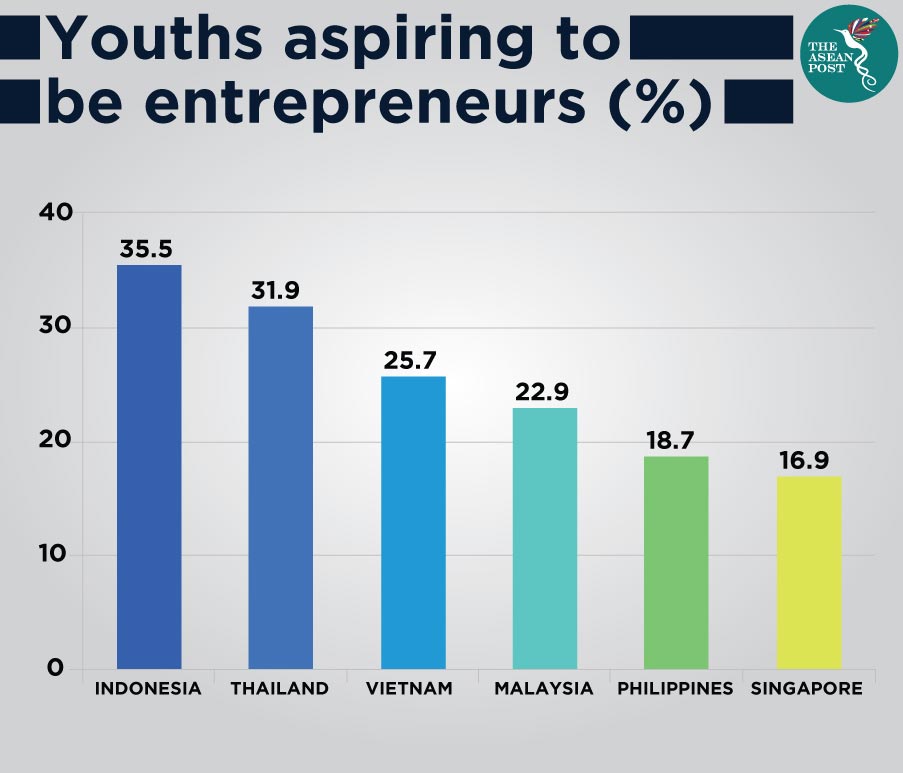ASEAN youths are highly aware of potential disruption and challenges brought on by technological advancement in the job market, requiring them to upgrade their skills regularly. The changing market is also encouraging the development of entrepreneurial skills among the youth, looking to be part of the region’s already booming start-up ecosystem.
ASEAN’s youth have a strong preference for entrepreneurial settings according to a 2019 report by the World Economic Forum (WEF) titled ‘ASEAN youth: technology, skills and the future of work’. The report found that 31.4 percent of youth are either entrepreneurs or work for a start-up.
The WEF report revealed that 31.9 percent of Thailand’s youth have robust entrepreneurial aspirations, behind Indonesia (35.5 percent). A joint report in 2018 by the Sea Group and WEF titled, ‘Youth x Entrepreneurship in Thailand’, revealed that youths without a Bachelor’s degree or basic college qualification are more likely to choose entrepreneurship (42 percent) compared to those with a college degree (25 percent).
The Global Entrepreneurship Index (GEI) 2018 ranked Thailand 71st out of 137 countries around the world and 15th out of 28 countries in the Asia-Pacific region based on its quality of entrepreneurship and the extent of the entrepreneurial support ecosystem. Thai society also encourages entrepreneurship, making the nation a fertile ground for young Thais to begin start-ups.
Economic empowerment
Entrepreneurship is a form of economic empowerment for founders and their talents to participate in the country’s economy and social development through their investments, innovation and jobs creation.
The Youth Entrepreneurship in Asia and the Pacific report by Global Entrepreneurship Monitor (GEM) and Youth Co:Lab in 2019, states that 14.6 percent of early-stage entrepreneurs in Thailand are aged between 18-34 years old. The GEM report also revealed there are barriers for youths when creating start-ups, including a lack of mentors in business and management skills, financial constraints, funding and equal access to markets.

When it comes to funding, 60 percent of Thai youths require external financing to start their enterprise, but the young are 33 percent less likely to have a savings account than adults. Access to microfinancing and loans would significantly help young entrepreneurs start their enterprises. Fortunately for Thai youths, there are funding opportunities provided by the government. The Ministry of Digital Economy and Society (MDES) has set up a US$570 million start-up fund for youth with a university background. The Ministry of Finance has set up a US$285 million fund for start-ups in healthcare, finance, agriculture, tourism and digital tech.
Thailand is a nascent market for entrepreneurship, yet there have been numerous initiatives to improve the start-up ecosystem, especially to encourage the youth.
The National Innovation Agency (NIA), a government agency aimed at encouraging innovation, recently overhauled its financial support program for start-ups to accelerate their progress, facilitating access to US$1.4 billion in funding. This strategy aims to build 3,000 innovation-based start-ups in the next 10 years, and the program will train and network with students to help develop deep tech entrepreneurs.
The government of Thailand, in partnership with True Digital Park (TDPK), created the country’s first and ASEAN’s largest digital innovation hub for start-ups to work within an integrated community. Initiatives like this emphasise Thailand’s dedication to a digital transformation and an effort to build up the country’s tech ecosystem.
“TDPK enhances the competency of start-ups and tech entrepreneurs, helping them reach their full potential, grow and compete in the global marketplace,” said Thanasorn Jaidee, President of True Digital Park.
Youth skills
Youth Co: Lab an emerging initiative, co-created by the United Nations Development Programme (UNDP) and the Citi Foundation, is helping young people to succeed in their ventures by providing a strong pre-incubation pipeline. Youth Co:Lab posits that developing youths’ skills can sustain youth-led start-ups and social enterprises across the region.
The Asia Institute of Technology (AIT) is preparing students for the digitally disrupted job market. Eden Woon, President of AIT, said that the best approach for an uncertain future is to prepare students to be adaptable and to take on unique challenges, through multidisciplinary education. “The grandest challenges are not solved by only chemistry or only physics, they are solved by an assortment of fields,” he said, believing that Thailand’s youth are also interested in launching a start-up or starting a business.
The AIT recently opened an entrepreneurship centre to offer students with real-world business experience and collaboration opportunities with private business. AIT is also collaborating with local firms and start-ups to discuss innovations and ways to combine social impact research with new business ideas.
“Students who come to AIT are very socially conscious because they study fields in social impact areas. Some might want to start a business so the centre can provide education, leads, mentorship and information to whoever’s interested,” Woon added.
“Youth are changemakers in society when they engage with challenges head-on through innovation, using their skills and energy to identify practical solutions,” said Renaud Meyer, UNDP Thailand’s Resident Representative.
Youths need an ecosystem that enables them to take an idea forward, strong role models and a positive environment where policies and regulations help grassroots innovation and entrepreneurship thrive. Investing in the youth enhances their ability to make informed choices, and empowering them with knowledge and skills needed to shape the future of the nation.
Related articles:
Thailand’s tech start-ups continue their ascent
Thailand’s digital park targets tech businesses wanting to relocate to Southeast Asia
